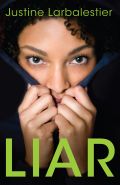Bloomsbury is replacing Liar's jacket for the hardcover release in October: 
This week Bloomsbury officials have switched course. "We regret that our original creative direction for Liar—which was intended to symbolically reflect the narrator’s complex psychological makeup—has been interpreted by some as a calculated decision to mask the character's ethnicity," Bloomsbury officials said in a statement to PW. "In response to this concern, and in support of the author’s vision for the novel, Bloomsbury has decided to re-jacket the hardcover edition with a new look in time for its publication in October. It is our hope that the important discussions about race and its representation in teen literature continue. As the publisher of Liar, we also hope that nothing further distracts from the quality of the author’s nuanced and accomplished story, and that a new cover will allow this novel's many advocates to celebrate its U.S. publication without reservation."
I sure hope Justine's book can now get the response it deserves.
And update: Justine has posted the new cover (see right). Isn't it just gorgeous?
“…intended to symbolically reflect the narrator’s complex psychological makeup…”? Oh, please. Unless the protagonist had racial self-identification issues (something I haven’t read in any of the extensive coverage this story has gotten) then there’s absolutely no good reason for this cover photograph.
It’s definitely a very political non-apology. After all, it puts the wrong on the part of those who “interpreted.” But, still, good outcome. And in publishing, as in politics, no one ever admits they were WRONG.
Such good news. I noticed the non-apology too, but the key thing is that they were willing to step back, re-evaluate, and then make concrete changes (rather than just apologize) in response — even knowing, as they must, that this close to the pub date they’ll be out a significant chunk of money as a result, because the original covers must already be printed.
The taking of action speaks louder to me than the imperfect words, in this case.
Sure — I’m just always a little eyebrowsy at a “sorry you were offended” statement. I think apologies are overrated, but statements that admit “hey, we were wrong,” well, I think we could use more of them across the board. Not even talking about this specific situation. I think often these kinds of phrasings come from lawyers. (No offense to lawyers.)
That said, I’ve no doubt that everyone involved can agree this is the right outcome. I give Bloomsbury a great deal of credit.
Absolutely beautiful. Congratulations.